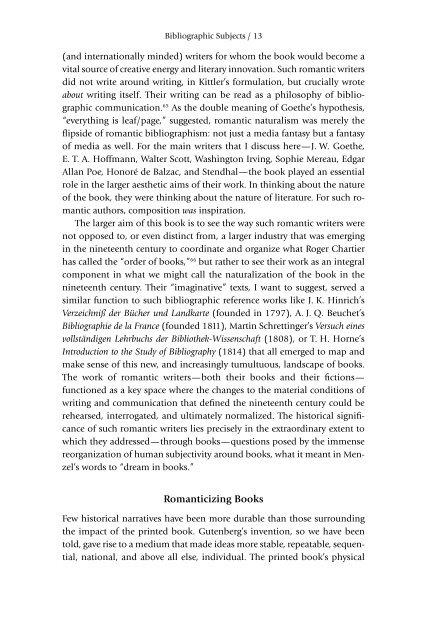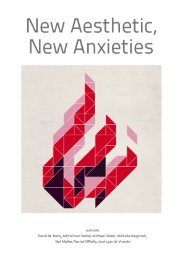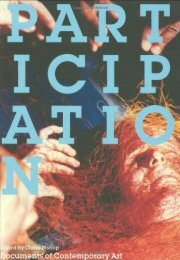Dreaming in Books - uncopy
Dreaming in Books - uncopy
Dreaming in Books - uncopy
Create successful ePaper yourself
Turn your PDF publications into a flip-book with our unique Google optimized e-Paper software.
Bibliographic Subjects / 13<br />
(and <strong>in</strong>ternationally m<strong>in</strong>ded) writers for whom the book would become a<br />
vital source of creative energy and literary <strong>in</strong>novation. Such romantic writers<br />
did not write around writ<strong>in</strong>g, <strong>in</strong> Kittler’s formulation, but crucially wrote<br />
about writ<strong>in</strong>g itself. Their writ<strong>in</strong>g can be read as a philosophy of bibliographic<br />
communication. 65 As the double mean<strong>in</strong>g of Goethe’s hypothesis,<br />
“everyth<strong>in</strong>g is leaf / page,” suggested, romantic naturalism was merely the<br />
fl ipside of romantic bibliographism: not just a media fantasy but a fantasy<br />
of media as well. For the ma<strong>in</strong> writers that I discuss here—J. W. Goethe,<br />
E. T. A. Hoffmann, Walter Scott, Wash<strong>in</strong>gton Irv<strong>in</strong>g, Sophie Mereau, Edgar<br />
Allan Poe, Honoré de Balzac, and Stendhal—the book played an essential<br />
role <strong>in</strong> the larger aesthetic aims of their work. In th<strong>in</strong>k<strong>in</strong>g about the nature<br />
of the book, they were th<strong>in</strong>k<strong>in</strong>g about the nature of literature. For such romantic<br />
authors, composition was <strong>in</strong>spiration.<br />
The larger aim of this book is to see the way such romantic writers were<br />
not opposed to, or even dist<strong>in</strong>ct from, a larger <strong>in</strong>dustry that was emerg<strong>in</strong>g<br />
<strong>in</strong> the n<strong>in</strong>eteenth century to coord<strong>in</strong>ate and organize what Roger Chartier<br />
has called the “order of books,” 66 but rather to see their work as an <strong>in</strong>tegral<br />
component <strong>in</strong> what we might call the naturalization of the book <strong>in</strong> the<br />
n<strong>in</strong>eteenth century. Their “imag<strong>in</strong>ative” texts, I want to suggest, served a<br />
similar function to such bibliographic reference works like J. K. H<strong>in</strong>rich’s<br />
Verzeichniß der Bücher und Landkarte (founded <strong>in</strong> 1797), A. J. Q. Beuchet’s<br />
Bibliographie de la France (founded 1811), Mart<strong>in</strong> Schrett<strong>in</strong>ger’s Versuch e<strong>in</strong>es<br />
vollständigen Lehrbuchs der Bibliothek- Wissenschaft (1808), or T. H. Horne’s<br />
Introduction to the Study of Bibliography (1814) that all emerged to map and<br />
make sense of this new, and <strong>in</strong>creas<strong>in</strong>gly tumultuous, landscape of books.<br />
The work of romantic writers—both their books and their fi ctions—<br />
functioned as a key space where the changes to the material conditions of<br />
writ<strong>in</strong>g and communication that defi ned the n<strong>in</strong>eteenth century could be<br />
rehearsed, <strong>in</strong>terrogated, and ultimately normalized. The historical signifi -<br />
cance of such romantic writers lies precisely <strong>in</strong> the extraord<strong>in</strong>ary extent to<br />
which they addressed—through books—questions posed by the immense<br />
reorganization of human subjectivity around books, what it meant <strong>in</strong> Menzel’s<br />
words to “dream <strong>in</strong> books.”<br />
Romanticiz<strong>in</strong>g <strong>Books</strong><br />
Few historical narratives have been more durable than those surround<strong>in</strong>g<br />
the impact of the pr<strong>in</strong>ted book. Gutenberg’s <strong>in</strong>vention, so we have been<br />
told, gave rise to a medium that made ideas more stable, repeatable, sequential,<br />
national, and above all else, <strong>in</strong>dividual. The pr<strong>in</strong>ted book’s physical








